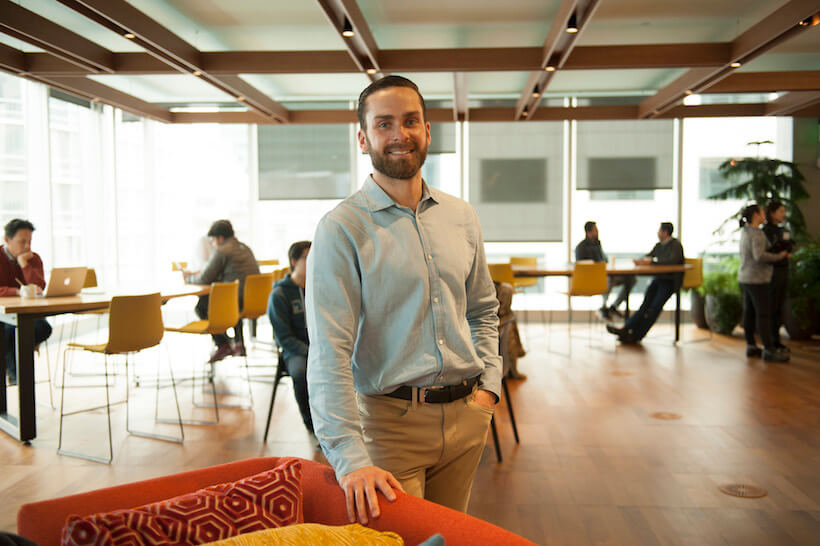Salesforce Ventures today announced a new $50 million Australia Trailblazer Fund to empower Australian startups and invest in innovation to create next-generation technology, grow in the Salesforce ecosystem and drive customer success.
The unveiling of the Australia Trailblazer Fund fund kicks off Salesforce World Tour Sydney, taking place this week at The Sydney International Convention Centre.

Over the last decade, Salesforce Ventures has invested in the growth of more than 300 companies, across 20 countries. Salesforce Ventures has also announced regional funds focused on EMEA, Canada, and Japan. With these funds, Salesforce Ventures deepens its commitment to creating the world’s largest ecosystem of enterprise cloud companies to fuel customer success.
In conjunction with the announcement, Rob Keith, Salesforce Ventures’ Head of Australia and one of the first three employees on the Ventures team, is moving from the San Francisco Bay Area to Sydney, Australia to oversee the fund. In this interview, Rob discusses what he sees as the opportunity in Australian and what makes Salesforce Ventures unique.
Q: Please tell us about your background. How did you start working in venture capital and what brought you to Salesforce Ventures?
After I graduated from University of Southern California, I ended up working on Wall Street in Morgan Stanley’s technology banking group. I like to tell people that it was the best two years of my life that I never want to experience again, but I was incredibly lucky to have access to some of the most innovative startups in Silicon Valley.
I got connected to Salesforce and the Ventures team in 2012 through one of the deals I worked on while at Morgan Stanley — the Veeva Systems IPO. Veeva, which built a CRM solution for the life sciences industry on the Salesforce platform, was one of the first Salesforce partners to go public. It opened my eyes to the power of Salesforce as an innovation platform. I was able to leverage that relationship into a meeting with the leaders of Salesforce Ventures, John Somorjai — executive vice president of corporate development who started Salesforce Ventures in 2009–and Managing Partner Matt Garratt in 2014, which is when they were really starting to scale the investment team. I was immediately drawn to the vision that they had for the program. It’s been amazing to see the growth and expansion, especially international growth, over the past five years.
Q: What are some examples of the most exciting enterprise technologies you’ve invested in?
It becomes hard to single out specific deals during my time at Salesforce. Since I joined, we’ve probably worked on close to 100+ investments and each of them has been memorable in their own unique way.
One deal in particular that stands out is the first investment we made after I joined. It was in a digital agency called DEG. They were one of Marketing Cloud’s leading implementation partners and run by some of the hardest working entrepreneurs, who had bootstrapped the company up until then. They were actually recently acquired by Dentsu for $350m, and it was great to see the business evolve from start to finish.
Another one that sticks out is MuleSoft. We were very lucky to be involved early with MuleSoft and helped to lead their pre-IPO investment. When we first met President and CEO Greg Schott and the team back in 2015, I came away impressed with the company culture and how passionate they were around customer success. Our thesis at the time was around MuleSoft becoming the de facto integration platform, allowing customers to seamlessly connect applications, systems, devices and data within and across all organizations. We knew that this was a large market opportunity when we invested, and it’s been really exciting to see them now become part of the Salesforce family.
Q: What are some of the market trends you are seeing for 2019?
We think a big trend we’ll continue to see is the thesis that the private markets are the new public markets. Companies are staying private longer and going public later in their lifecycles, increasing the impact on the ecosystem that private companies have. This has caused a huge influx of new capital into the overall system. We’re seeing tons of new venture capital funds launching, and this has really driven up deal sizes and valuations. Today there are have close to 200+ unicorns. By contrast, if you go back 10 years, we had a handful of them. As these companies start to look for liquidity it will be interesting to see how receptive the public markets will be to them given the recent volatility. Companies like Uber, Lyft and Slack have already begun going down the IPO process. So it seems like 2019 will have more liquidity through the public markets than through M&A although we have seen huge deals recently such as with SAP / Qualtrics and Hellman & Friedman / Ultimate Software.
In terms of technology trends, at Salesforce Ventures we believe that digital transformation is still in the very early innings. Investors and non-traditional technology companies are looking to capitalize on the digital transformation wave, as software continues to eat the world and companies are putting the customer at the center of everything they do. We’re just now going through the Fourth Industrial Revolution, with machine learning, AI, and IoT technologies just starting to take shape within the enterprise.

Q: What do you think makes Salesforce Ventures unique in the VC world?
With an ever-increasing supply of venture capital pouring into the market, it’s imperative to be differentiated. I’m incredibly passionate about the model we’re building here at Salesforce Ventures. We have the global reach of a large-scale venture firm that’s backed by the brand reputation of Salesforce.
We also have a unique investing mindset in that we are hyper-focused on partnering with amazing entrepreneurs who are focused on customer success. When we walk into a room to meet with a CEO, we are backed not only by the entire Salesforce ecosystem but also the knowledge gained from doing more than 300 investments. Salesforce pioneered the SaaS and cloud model 20 years ago, and the internal knowledge and resources that we have at our disposal are really unmatched. I’m definitely excited to take all of this to the Australian market.
Q: Salesforce Ventures ‘invests in innovation’ — what does that mean to you?
I think of innovation as ideas that aim to solve existing problems in a unique way or a creative idea that provides solutions to an emerging problem that will become mainstream in the future. We like to invest in companies that are creating a technology that is 10X times better than an existing solution today, or that are building a technology that is solving a new problem in an emerging market. We always view this from a customer’s framework and mindset. What pain points does the customer have today that we can solve, or what are some of the problems that we know they’re going to run into 3-5 years from now?
Q: Let’s talk about Australia. You’re moving to Sydney to lead the investments there. What are you most excited about with that opportunity?
I’ve always had an entrepreneurial bug inside me. I think the opportunity to move to a new market and help shape the Salesforce Ventures brand is a big one. When I joined Salesforce five years ago, this was one of the things that drew me to the position. I could have joined an already established venture firm, but I really wanted to join a group that was building something special and lasting.
I view the Australian opportunity as similar to when I first started — a new venture. In Australia and New Zealand, the successes of companies like Atlassian and Xero have helped to spur a tech ecosystem and created a flywheel for further innovation. We’ve seen the second wave of amazing enterprise companies emerge such as Canva, Deputy, Safety Culture, and Culture Amp. We also believe the Australian market is on the verge of breaking out from a startup and venture capital point of view. There is a combination of talent, capital, great research universities and successful exits that create a great network effect. Australia is beginning to capitalize on that.
Q: In addition to the new Australia Fund, Salesforce has started some similar funds, including the Japan Fund, and the Canada Fund. What are the advantages gained from launching these regional investments?
We gain a lot from planting a flag in the ground in these regions and markets. We want to let venture capitalists and entrepreneurs know that Salesforce is here to help emerging businesses become successful. When we first started building the program in 2014 we had to do a lot of marketing and branding around what Salesforce Ventures was. Now we can truly help those regional entrepreneurs as strategic investors. We think the success we’ve seen in Canada, Europe, and Japan is driving the need and demand to create more regional-focused funds.
Q: If you picture yourself a year from now – a year from when the fund launches – what do you hope to accomplish?
I hope over the next year, we are able to deliver a similar impact to what we’ve seen in other parts of the world, like the U.S., Canada, Europe, and Japan, and really help to grow the Australian startup ecosystem. Our hope is that Salesforce Ventures is one of the first venture firms that SaaS entrepreneurs reach out to when they decide to raise capital and bring on partners. We have gained valuable experience in seeing how regional funds can drive success for companies and customers across industries.
I truly think we are in the early innings of the startup ecosystem in Australia, and I’m incredibly excited to be able to participate in and help shape the forefront of the technology ecosystem there.














